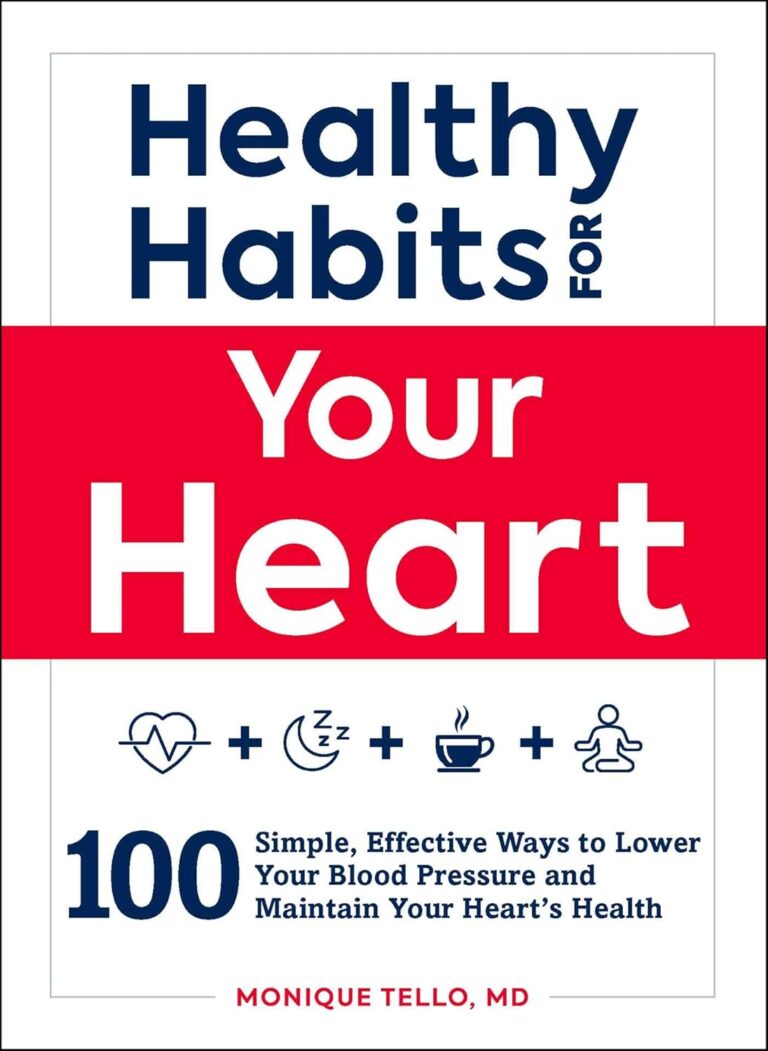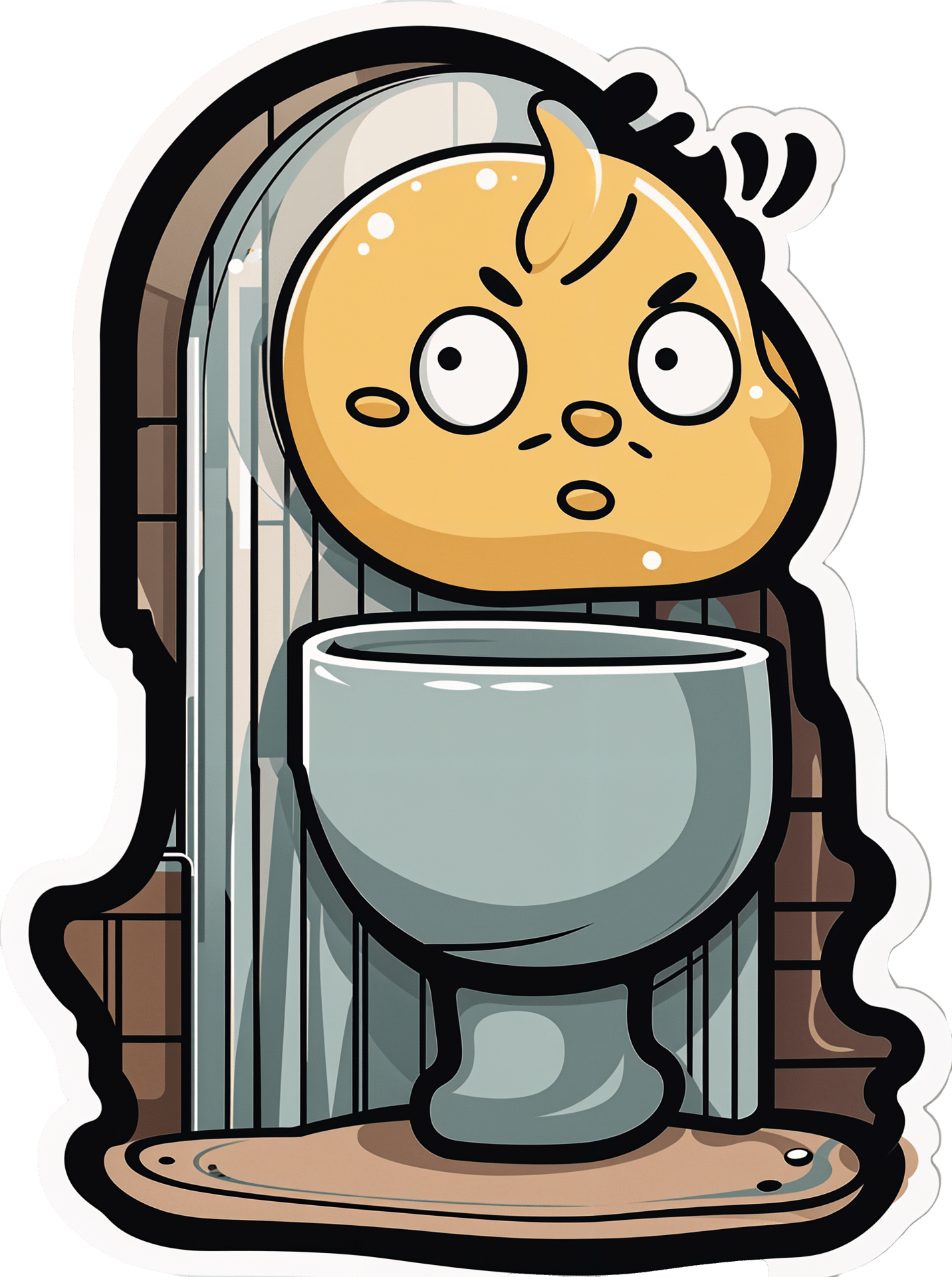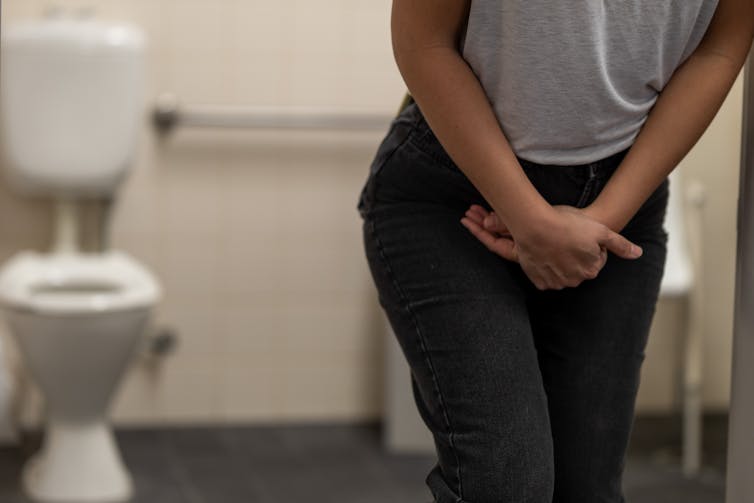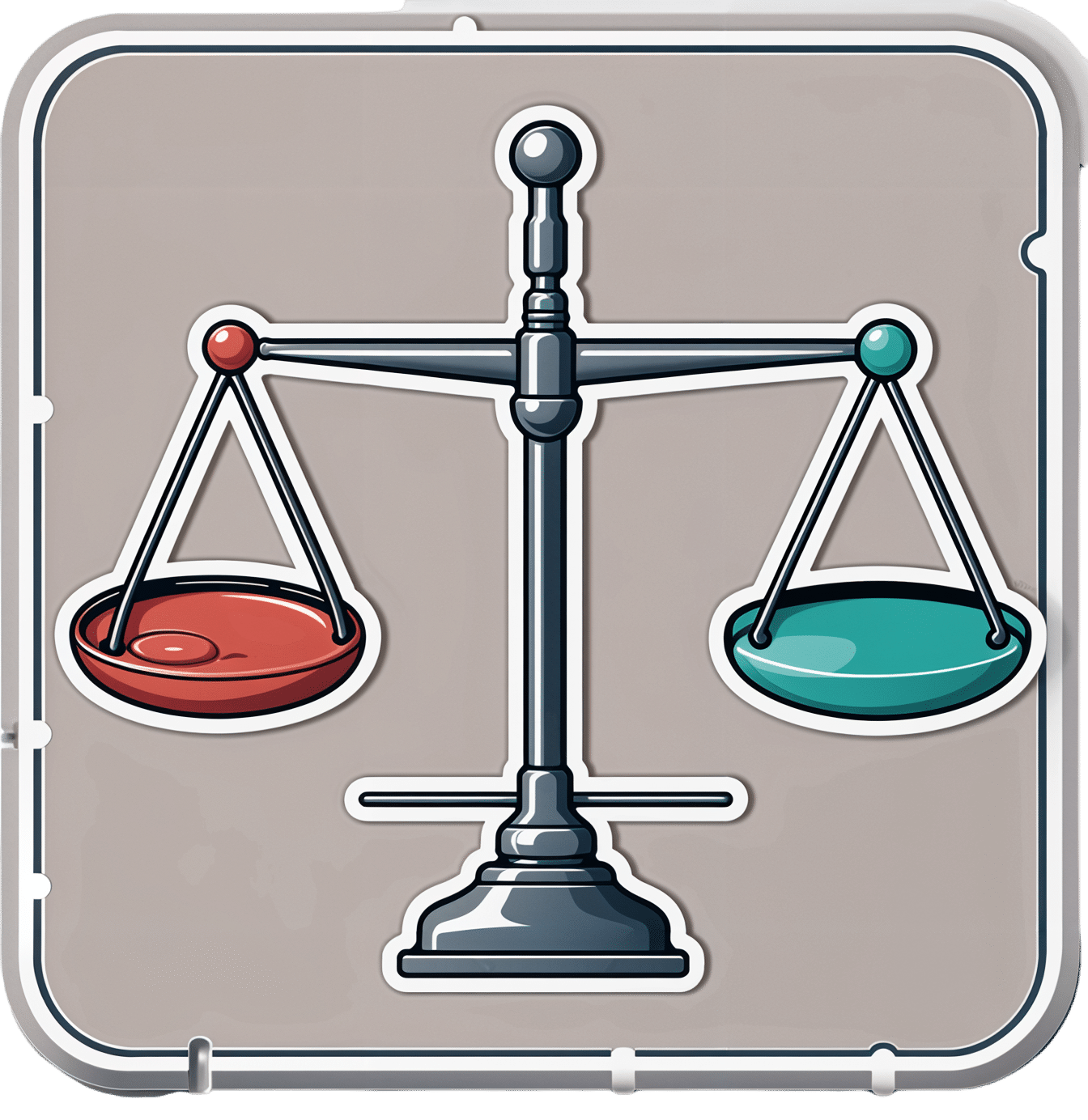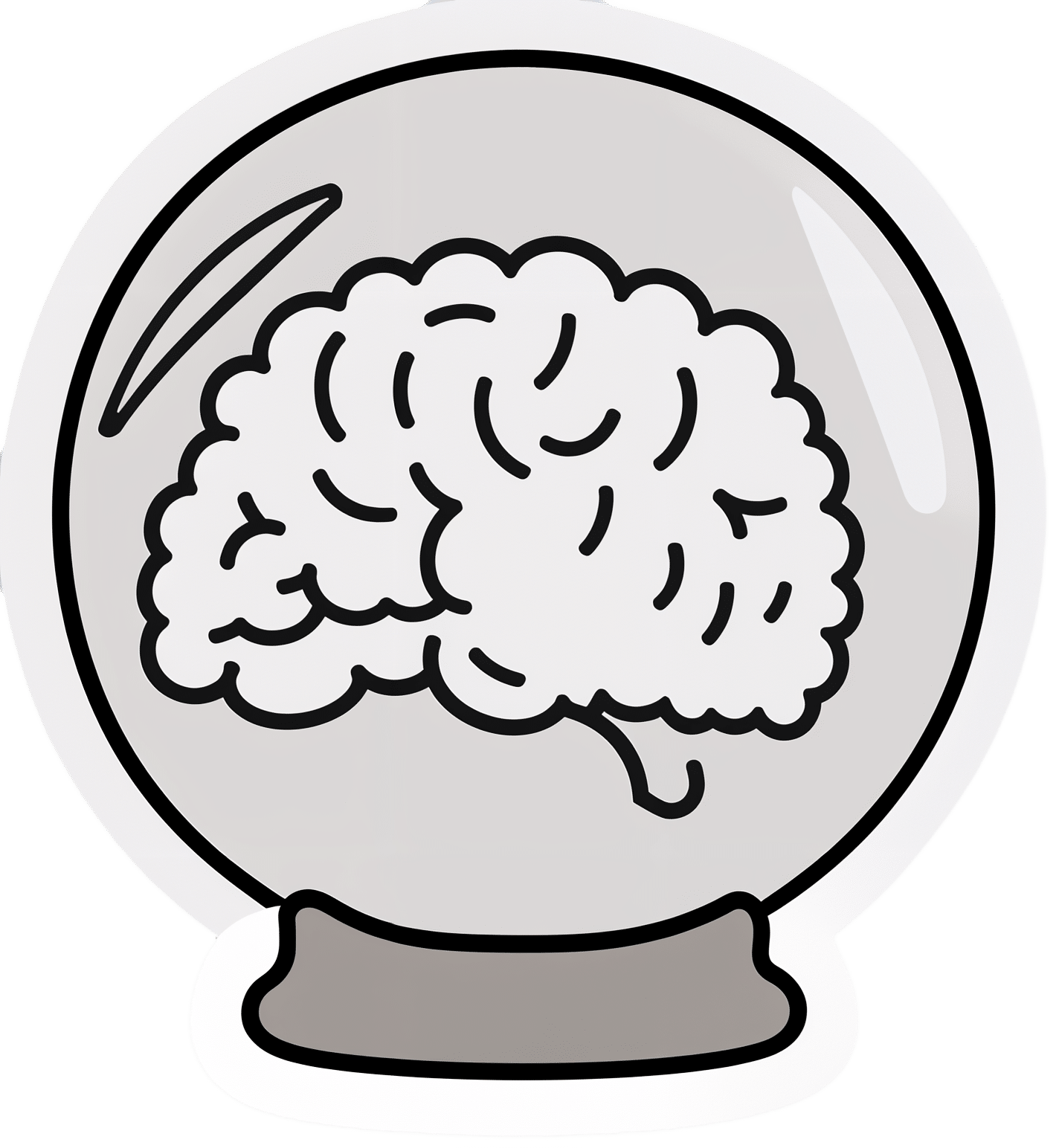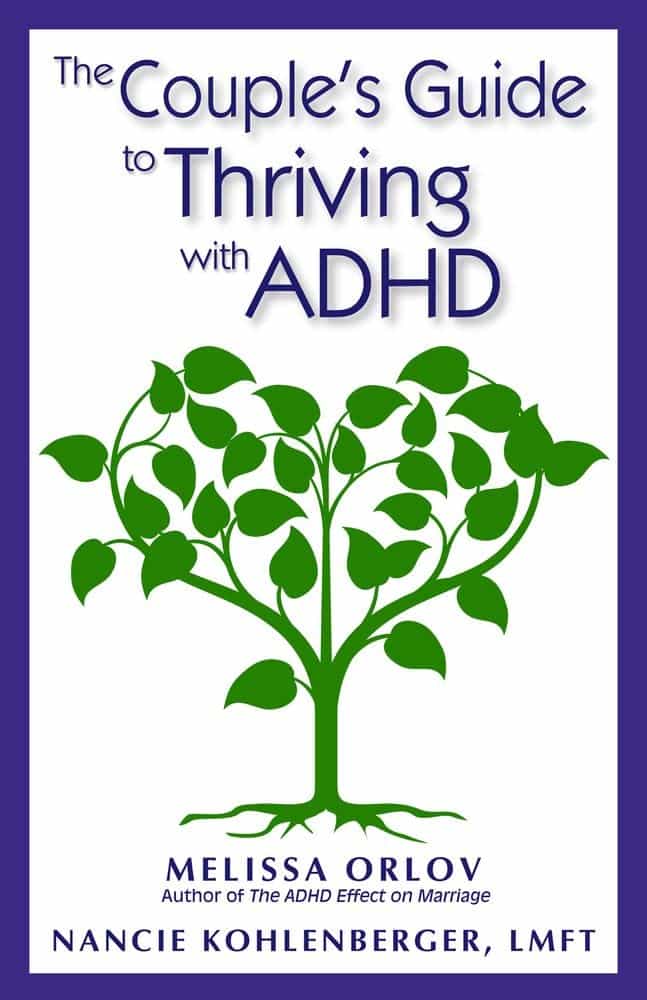
The Couple’s Guide to Thriving with ADHD – by Melissa Orlov and Nancie Kohlenberger
10almonds is reader-supported. We may, at no cost to you, receive a portion of sales if you purchase a product through a link in this article.
ADHD (what a misleadingly-named condition) is most often undiagnosed in adults, especially older adults, and has far-reaching effects. This book explores those!
Oftentimes ADHD is not a deficit of attention, it’s just a lack of choice about where one’s attention goes. And the H? It’s mostly not what people think it is. The diagnostic criteria have moved far beyond the original name.
But in a marriage, ADHD symptoms such as wandering attention, forgetfulness, impulsiveness, and a focus on the “now” to the point of losing sight of the big picture (the forgotten past and the unplanned future), can cause conflict.
The authors write in a way that is intended for the ADHD and/or non-ADHD partner to read, and ideally, for both to read.
They shine light on why people with or without ADHD tend towards (or away from) certain behaviours, what miscommunications can arise, and how to smooth them over.
Best of all, an integrated plan for getting you both on the same page, so that you can tackle anything that arises, as the diverse team (with quite different individual strengths) that you are.
Bottom line: if you or a loved one has ADHD symptoms, this book can help you navigate and untangle what can otherwise sometimes get a little messy.
Click here to check out The Couple’s Guide to Thriving with ADHD, and learn how to do just that!
Don’t Forget…
Did you arrive here from our newsletter? Don’t forget to return to the email to continue learning!
Recommended
Learn to Age Gracefully
Join the 98k+ American women taking control of their health & aging with our 100% free (and fun!) daily emails:
-
Why do I need to get up during the night to wee? Is this normal?
10almonds is reader-supported. We may, at no cost to you, receive a portion of sales if you purchase a product through a link in this article.
It can be normal to wake up once or even twice during the night to wee, especially as we get older.
One in three adults over 30 makes at least two trips to the bathroom every night.
Waking up from sleep to urinate on a regular basis is called nocturia. It’s one of the most commonly reported bothersome urinary symptoms (others include urgency and poor stream).
So what causes nocturia, and how can it affect wellbeing?
A range of causes
Nocturia can be caused by a variety of medical conditions, such as heart or kidney problems, poorly controlled diabetes, bladder infections, an overactive bladder, or gastrointestinal issues. Other causes include pregnancy, medications and consumption of alcohol or caffeine before bed.
While nocturia causes disrupted sleep, the reverse is true as well. Having broken sleep, or insomnia, can also cause nocturia.
When we sleep, an antidiuretic hormone is released that slows down the rate at which our kidneys produce urine. If we lie awake at night, less of this hormone is released, meaning we continue to produce normal rates of urine. This can accelerate the rate at which we fill our bladder and need to get up during the night.
Stress, anxiety and watching television late into the night are common causes of insomnia.
Sometimes we need to get up late at night to pee.
Christian MoroEffects of nocturia on daily functioning
The recommended amount of sleep for adults is between seven and nine hours per night. The more times you have to get up in the night to go to the bathroom, the more this impacts sleep quantity and quality.
Decreased sleep can result in increased tiredness during the day, poor concentration, forgetfulness, changes in mood and impaired work performance.
If you’re missing out on quality sleep due to nighttime trips to the bathroom, this can affect your quality of life.
In more severe cases, nocturia has been compared to having a similar impact on quality of life as diabetes, high blood pressure, chest pain, and some forms of arthritis. Also, frequent disruptions to quality and quantity of sleep can have longer-term health impacts.
Nocturia not only upsets sleep, but also increases the risk of falls from moving around in the dark to go to the bathroom.
Further, it can affect sleep partners or others in the household who may be disturbed when you get out of bed.
Can you have a ‘small bladder’?
It’s a common misconception that your trips to the bathroom are correlated with the size of your bladder. It’s also unlikely your bladder is smaller relative to your other organs.
If you find you are having to wee more than your friends, this could be due to body size. A smaller person drinking the same amount of fluids as someone larger will simply need to go the bathroom more often.
If you find you are going to the bathroom quite a lot during the day and evening (more than eight times in 24 hours), this could be a symptom of an overactive bladder. This often presents as frequent and sudden urges to urinate.
If you are concerned about any lower urinary tract symptoms, it’s worth having a chat with your family GP.
There are some medications that can assist in the management of nocturia, and your doctor will also be able to help identify any underlying causes of needing to go to the toilet during the night.
A happy and healthy bladder
Here are some tips to maintain a happy and healthy bladder, and reduce the risk you’ll be up at night:
- make your sleep environment comfortable, with a suitable mattress and sheets to suit the temperature
- get to bed early, and limit screens, or activites before bed
- limit foods and drinks that irritate the bladder, such as coffee or alcohol, especially before bedtime
- sit in a relaxed position when urinating, and allow time for the bladder to completely empty
- practice pelvic floor muscle exercises
- drink an adequate amount of fluids during the day, and avoid becoming dehydrated
- maintain a healthy lifestyle, eat nutritious foods and do not do anything harmful to the body such as smoking or using illicit drugs
- review your medications, as the time you take some pharmaceuticals may affect urine production or sleep
- if you have swollen legs, raise them a few hours before bedtime to let the fluid drain.
Christian Moro, Associate Professor of Science & Medicine, Bond University and Charlotte Phelps, Senior Teaching Fellow, Medical Program, Bond University
This article is republished from The Conversation under a Creative Commons license. Read the original article.
Share This Post
-
Dr. Kim Foster’s Method For Balancing Hormones Naturally
10almonds is reader-supported. We may, at no cost to you, receive a portion of sales if you purchase a product through a link in this article.
Not just sex hormones, but also hormones like cortisol (the stress hormone), and thyroid hormones (for metabolism regulation) too! The body is most of the time self-regulating when it comes to hormones, but there are things that we can do to help our body look after us correctly.
In short, if we give our body what it needs, it will (usually, barring serious illness!) give us what we need.
Dr. Foster recommends…
Foods:
- Healthy fats (especially avocados and nuts)
- Lean proteins (especially poultry, fish, and legumes)
- Fruits & vegetables (especially colorful ones)
- Probiotics (especially fermented foods like sauerkraut, kimchi, etc)
- Magnesium-rich foods (especially dark leafy greens, nuts, and yes, dark chocolate)
Teas:
- Camomile tea (especially beneficial against cortisol overproduction)
- Nettle tea (especially beneficial for estrogen production)
- Peppermint tea (especially beneficial for gut health, thus indirect hormone benefits)
Stress reduction:
- Breathing exercises (especially mindfulness exercises)
- Yoga (especially combining exercise with stretches)
- Spending time in nature (especially green spaces)
Dr. Foster explains more about all of these things, along with more illustrative examples, so if you can, do enjoy her video:
Click Here If The Embedded Video Doesn’t Load Automatically!
Want to read more about this topic?
You might like our main feature: What Does “Balance Your Hormones” Even Mean?
Enjoy!
Share This Post
-
Xylitol vs Erythritol – Which is Healthier?
10almonds is reader-supported. We may, at no cost to you, receive a portion of sales if you purchase a product through a link in this article.
Our Verdict
When comparing xylitol to erythritol, we picked the xylitol.
Why?
They’re both sugar alcohols, which so far as the body is concerned are neither sugars nor alcohols in the way those words are commonly understood; it’s just a chemical term. The sugars aren’t processed as such by the body and are passed as dietary fiber, and nor is there any intoxicating effect as one might expect from an alcohol.
In terms of macronutrients, while technically they both have carbs, for all functional purposes they don’t and just have a little fiber.
In terms of micronutrients, they don’t have any.
The one thing that sets them apart is their respective safety profiles. Xylitol is prothrombotic and associated with major adverse cardiac events (CI=95, adjusted hazard ratio=1.57, range=1.12-2.21), while erythritol is also prothrombotic and more strongly associated with major adverse cardiac events (CI=95, adjusted hazard ratio=2.21, range=1.20-4.07).
So, xylitol is bad and erythritol is worse, which means the relatively “healthier” is xylitol. We don’t recommend either, though.
Studies for both:
- Xylitol is prothrombotic and associated with cardiovascular risk
- The artificial sweetener erythritol and cardiovascular event risk
Links for the specific products we compared, in case our assessment hasn’t put you off them:
Want to learn more?
You might like to read:
- The WHO’s New View On Sugar-Free Sweeteners ← the WHO’s advice is “don’t”
- Stevia vs Acesulfame Potassium – Which is Healthier? ← stevia’s pretty much the healthiest artificial sweetener around, though, if you’re going to use one
- The Fascinating Truth About Aspartame, Cancer, & Neurotoxicity ← under the cold light of science, aspartame isn’t actually as bad as it was painted a few decades ago, mostly by a viral hoax letter. Per the WHO’s advice, it’s still good to avoid sweeteners in general, however.
Take care!
Share This Post
Related Posts
-
How Intermittent Fasting Reduces Heart Attack Risk (Directly, Not Via Weight Control!)
10almonds is reader-supported. We may, at no cost to you, receive a portion of sales if you purchase a product through a link in this article.
We’ve written before about the benefits of intermittent fasting, such as:
- Intermittent Fasting: What’s The Truth?
- 16/8 Intermittent Fasting For Beginners
- Before You Eat Breakfast: 3 Surprising Facts About Intermittent Fasting
Intermittent fasting is mostly enjoyed for its metabolic benefits, such as How To Prevent And Reverse Type 2 Diabetes.
We also covered a very related topic, with intermittent fasting once again being on the suggestions list:
Improve Your Insulin Sensitivity! ← this is actually more important even that blood sugar control itself, important as that latter is!
So, how does it work to reduce heart attack risk?
While intermittent fasting can be used as a weight loss tool (it also doesn’t have to be—it depends on what you eat and what you’re doing in terms of exercise, amongst other factors), this isn’t about that.
Although it is also worth mentioning that intermittent fasting does reduce the risks associated with diabetes, hypercholesterolemia, cancer, Alzheimer’s, and more, as well as generally improving cardiovascular health by reducing blood pressure, cholesterol, and insulin resistance, amongst other metrics.
However, this is about platelet aggregation. Or in whole: platelet activation, aggregation, and thrombosis.
A team of scientists, Dr. Shimo Dai et al., investigated the effects of alternate-day intermittent fasting on platelets and thrombosis, in two quite different, but both important, demographics:
- Humans with coronary artery disease
- Mice with the ApoE gene (the Alzheimer’s risk gene)
Why the mice? Because they wanted to check the level of cerebral ischemia-reperfusion injury (the damage that occurs after a stroke), and no ethics board will let scientists slice up human participants brains at will.
In both cases, the intermittent fasting group enjoyed protective effects that the control group (ad libitum eating) did not.
Specifically, reduced platelet activation, as well as reduced platelet aggregation. Just to be clear:
- Platelet activation = platelets getting deployed
- Platelet aggregation = platelets sticking together
Both are required for thrombosis, which occurs when the platelets, having been activated and aggregated (which is their job, for example to stop bleeding in the case of an injury), block one or more blood vessels.
A healthy level of platelet activation and aggregation rests in the sweet spot wherefrom it can stop bleeding, without stopping blood circulation.
This was found to be associated with increased levels of indole-3-propionic acid (IPA), which is created by certain gut bacteria (C. sporogenes), who proliferate enthusiastically during intermittent fasting.
In few words:
- intermittent fasting triggers the C. sporogenes to proliferate,
- which increases IPA levels,
- which reduces platelet activation and aggregation,
- which reduces the risk of thrombosis,
- and thus reduces the risk of heart attack.
We may hypothesize that this may be a reason to not do intermittent fasting if you have a bleeding disorder, and consult your doctor if you’re on blood thinners.
For everyone else, this is one more thing that makes intermittent fasting a very healthful practice!
You can find the paper itself here:
And here’s a pop-science article that gets more technical than we have, if you’d like a middle-ground in terms of complexity:
Intermittent fasting cuts heart attack risk by preventing dangerous blood clots
Want to try intermittent fasting, but it sounds hard?
Check out this:
Enjoy!
Don’t Forget…
Did you arrive here from our newsletter? Don’t forget to return to the email to continue learning!
Learn to Age Gracefully
Join the 98k+ American women taking control of their health & aging with our 100% free (and fun!) daily emails:
-
How To Reduce Knee Pain After Sitting
10almonds is reader-supported. We may, at no cost to you, receive a portion of sales if you purchase a product through a link in this article.
Sitting is bad for the health, and doubly so if you have arthritis, as a lack of regular movement can cause joints to “seize up”. So, what to do about it if you have to sit for an extended time?
Dr. Alyssa Kuhn, arthritis specialist, explains:
Movement remains key
The trick is to continue periodically moving, notwithstanding that you may need to remain seated. So…
- Heel slides
- Straighten and bend your leg by sliding or lifting your heel.
- Promotes blood flow and reduces fluid buildup in the knee.
- Helps lubricate the joint, making standing up easier.
- Heel lifts
- Lift your heels up and down while keeping feet on the ground.
- This one’s ideal for tight spaces, such as when riding in a car or airplane.
- Improves blood circulation and can reduce ankle swelling and leg heaviness.
Do 20–30 repetitions every now and again, to keep your joints moving.
Note: if you are a wheelchair user whose legs lack the strength and/or motor function to do this, in this case it’s the movement of the leg that counts, not where that movement originated from. So, if you use one hand to lift your leg slightly and the other to push it like a swing, that will also be sufficient to give the joint the periodic movement it needs.
For more on all of this plus visual demonstrations, enjoy:
Click Here If The Embedded Video Doesn’t Load Automatically!
Want to learn more?
You might also like to read:
Stand Up For Your Health (Or Don’t) ← our main feature on this also includes more things you can do if you must sit, to make sitting less bad!
Take care!
Don’t Forget…
Did you arrive here from our newsletter? Don’t forget to return to the email to continue learning!
Learn to Age Gracefully
Join the 98k+ American women taking control of their health & aging with our 100% free (and fun!) daily emails:
- Heel slides
-
The Art of Being Unflappable (Tricks For Daily Life)
10almonds is reader-supported. We may, at no cost to you, receive a portion of sales if you purchase a product through a link in this article.
The Art of Being Unflappable
From Stoicism to CBT, thinkers through the ages have sought the unflappable life.
Today, in true 10almonds fashion, we’re going to distil it down to some concentrated essentials that we can all apply in our daily lives:
Most Common/Impactful Cognitive Distortions To Catch (And Thus Avoid)
These are like the rhetorical fallacies with which you might be familiar (ad hominem, no true Scotsman, begging the question, tu quoque, straw man, etc), but are about what goes on between your own ears, pertaining to your own life.
If we learn about them and how to recognize them, however, we can catch them before they sabotage us, and remain “unflappable” in situations that could otherwise turn disastrous.
Let’s take a look at a few:
Catastrophizing / Crystal Ball
- Distortion: not just blowing something out of proportion, but taking an idea and running with it to its worst possible conclusion. For example, we cook one meal that’s a “miss” and conclude we are a terrible cook, and in fact for this reason a terrible housewife/mother/friend/etc, and for this reason everyone will probably abandon us and would be right to do so
- Reality: by tomorrow, you’ll probably be the only one who even remembers it happened
Mind Reading
- Distortion: attributing motivations that may or may not be there, and making assumptions about other people’s thoughts/feelings. An example is the joke about two partners’ diary entries; one is long and full of feelings about how the other is surely dissatisfied in their marriage, has been acting “off” with them all day, is closed and distant, probably wants to divorce, may be having an affair and is wondering which way to jump, and/or is just wondering how to break the news—the other partner’s diary entry is short, and reads “motorcycle won’t start; can’t figure out why”
- Reality: sometimes, asking open questions is better than guessing, and much better than assuming!
All-or-Nothing Thinking / Disqualifying the Positive / Magnifying the Negative
- Distortion: having a negative bias that not only finds a cloud in every silver lining, but stretches it out so that it’s all that we can see. In a relationship, this might mean that one argument makes us feel like our relationship is nothing but strife. In life in general, it may lead us to feel like we are “naturally unlucky”.
- Reality: those negative things wouldn’t even register as negative to us if there weren’t a commensurate positive we’ve experienced to hold them in contrast against. So, find and remember that positive too.
For brevity, we put a spotlight on (and in some cases, clumped together) the ones we think have the most bang-for-buck to know about, but there are many more.
So for the curious, here’s some further reading:
Don’t Forget…
Did you arrive here from our newsletter? Don’t forget to return to the email to continue learning!
Learn to Age Gracefully
Join the 98k+ American women taking control of their health & aging with our 100% free (and fun!) daily emails:

